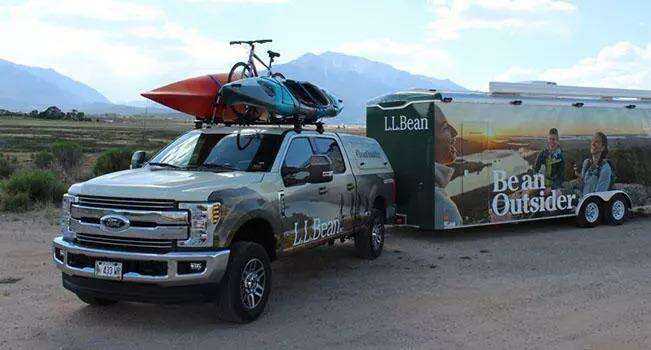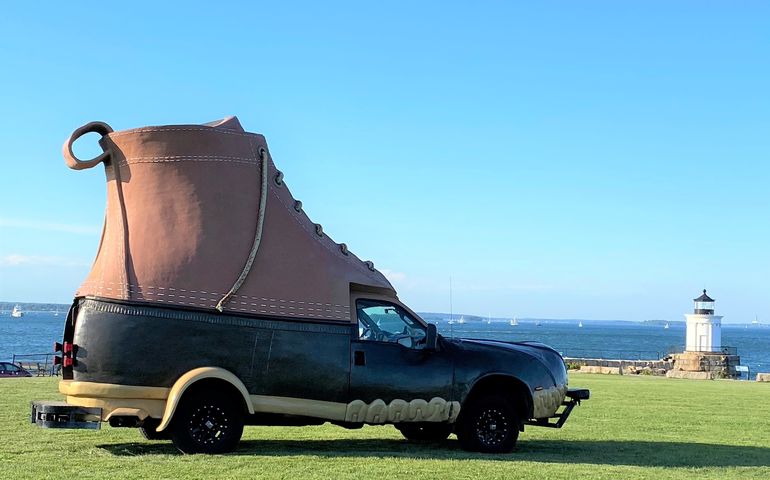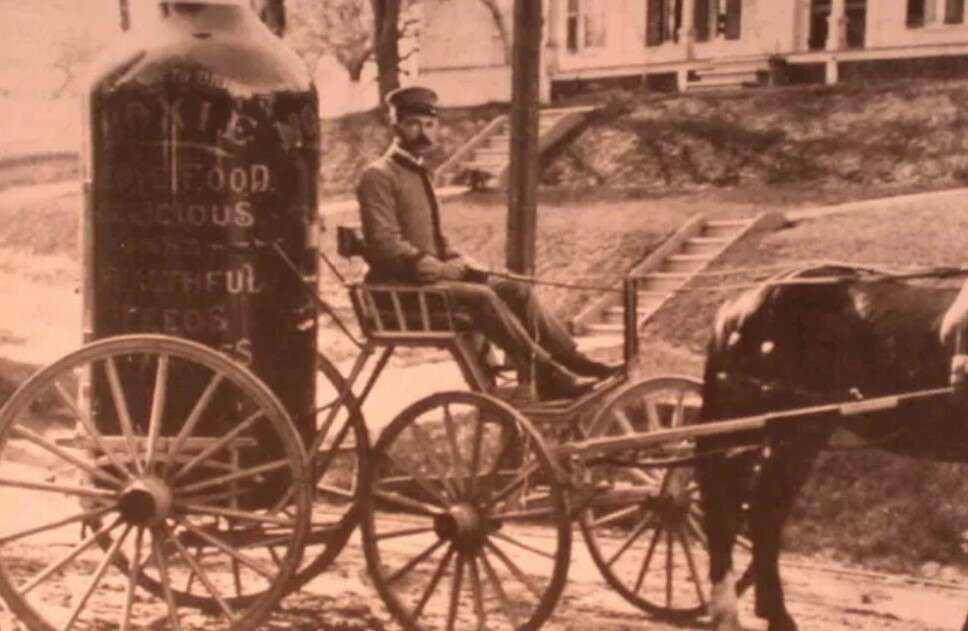
Mobile marketers in Maine consider a reboot
 Courtesy / City of South Portland
A Bean Bootmobile visits Bug Light Park in South Portland, where the marketing vehicle is scheduled to return Aug. 22-23.
Courtesy / City of South Portland
A Bean Bootmobile visits Bug Light Park in South Portland, where the marketing vehicle is scheduled to return Aug. 22-23.
More Information
With Maine retailers normally at the height of their busy summer season but now looking to recover from the devastating impact of the pandemic, they have big shoes to fill.
In the case of L.L.Bean Inc., size 708.
That’s the foot measurement of the Bean Bootmobile, a giant wheeled replica of the Freeport company’s iconic Maine Hunting Shoe. For eight years, Bean has used the vehicle as a movable marketing platform at venues across the country and even internationally.
Made from fiberglass and aluminum on the chassis of a pickup truck, the Bootmobile is 13 feet high and 20 feet long. Someone wearing this boot would stand 143 feet tall and tower 32 feet above the Statue of Liberty.
Since Bean first took the Bootmobile on the road to celebrate the 2012 centennial of the company’s founding, the vehicle — now with a fleet of three others — has covered more than 350,000 miles across 25 states and Canada. The Bootmobiles show up at pop-up sales, college campuses and a busy itinerary of outdoor events in the summer.
But this summer, the vehicles are sticking closer to their garage in Freeport and traveling only in a “limited capacity,” Bean spokeswoman Amanda Hannah told Mainebiz Thursday.
They’re “staying only in Maine and only doing small day trips close to Freeport without any overnight travel,” she said. Over the next three weekends, Bean will be driving to visits in Rockland, South Portland and Cape Elizabeth.
The Bootmobiles continue to attract stares and smiles wherever they park, Hannah said. But the company is following COVID-19 precautions and there are differences now at the stops.
“While we normally have people come right up to the Bootmobile, people have been cautious and maintained social distance when engaging with our drivers,” she said.
Marketing meltdown
If this were a typical year, Bean would be plying highways and byways. Retailers regularly travel with attention-getting vehicles, portable displays and temporary storefronts.
Part of what has come to be called “experiential marketing,” tours like these bring businesses directly to potential customers, allowing them to try out products, interact with salespeople, take part in an activity — or snap a selfie next to an enormous boot.
Last summer, Bean staged pop-up campsites in downtown New York City, as well as in Boston and other urban areas, where passersby were invited to roast marshmallows and enjoy outdoor games.

But like nearly all aspects of business, retail marketing has been upended by the pandemic.
One example took place not on the road, but outside Bean's front door.
In July, Freeport retailers including Bean opened pop-up sales spaces on streets the town temporarily closed to traffic. The weekend closures were intended to create a small outdoor plaza where shoppers could browse safely amid COVID-19 precautions.
But two weeks into the experiment, the town abandoned the plan. According to some reports, businesses complained that the mini-mall created extra expense and hassle, while drawing few customers.
Bean wouldn't disclose how much the economic downturn and store shutterings due to the pandemic have hurt sales. But the private company, which had revenue of $1.6 billion in 2018 and operates 54 U.S. stores, is clearly feeling the effect. Because of the pandemic, Bean's current workforce of 4,300 is about 200 less than it normally would be during the summer, CEO Stephen Smith told Mainebiz in an interview last month.
No GPS for this route
Back on the road, Bean isn't the only business that's taking a different marketing direction.
"The industry as a whole has had a very rough time," said Stephen Woods, president and CEO of TideSmart Global, a Falmouth firm that specializes in experiential marketing. "Before COVID, there were lots of opportunities for large congregate events. Now the goal is to bring business services and information [to the market] in a controlled, safe environment."
Most trade shows have been canceled since the beginning of March, Woods said, and many marketing agencies are closing their doors. With fewer venues and fewer marketing dollars, will there be fewer needs for a set of marketing wheels — even a popular vehicle like the Bootmobile?
Some experts see a potential upside amid the pandemic.
Experiential Vehicles, a Denver company that works with clients nationwide, recently noted in its blog: "Moving to a mobile asset that has a smaller square footage and is open air would circumvent the need to get people to walk inside a store ... As more stores move online a physical presence will still be desired from time to time.
"It will be interesting to see if COVID-19 creates a boom of retailers working out of mobile pop-up shops parked on street corners in urban areas or if entire outdoor malls are set up, perhaps in the unused parking lots of movie theaters. What is certain is that retail will need to evolve and mobile might be a way for small businesses to survive or reopen during the pandemic bringing their own style in the form of a mobile retail vehicle."
TideSmart has prepared for this type of mobile marketing in the new normal, according to Woods.
On its Falmouth campus, the firm operates a 24,000-square-foot logistics facility that routinely handles trade show displays, pop-up shops, vehicles and other equipment. Now much of the space is reconfigured to deal with COVID concerns. There are new types of pallets and new ventilation to help minimize the risk of spreading the disease, and "everything is disinfected," Woods said.
The company is also integrating health and safety protocols practiced by its medical subsidiary into marketing efforts.
It's all part of a new way of thinking about marketing, Woods believes.
"There needs to be a reset ... Anything that literally or figuratively touches the public needs to be carefully thought out," he told Mainebiz. "Marketers need to think about the change from before COVID to afterward, not about business as usual. The idea isn't to fight the change, but to incorporate it."
















0 Comments